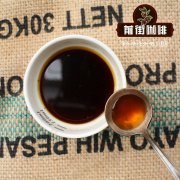How much is the best coffee in Africa? brand recommendation of African coffee beans? flavor characteristics of African beans

Professional coffee knowledge exchange more coffee bean information please follow the coffee workshop (Wechat official account cafe_style)
African coffee bean flavor: Ethiopian coffee has a strong orange flavor, Kenyan coffee has a strong raspberry flavor, as well as sour aromas of black plum juice and grapefruit, and sweet sugar cane. The orange aroma of Ethiopian coffee and the raspberry flavor of Kenyan coffee are the biggest features of African beans and attract coffee fans to delve into.
African coffee is generally characterized by strong aroma and charming acidity, its sour brightness is lively and exhilarating, but the mellow African coffee is often slightly thin and the sweetness is not very prominent. African coffee due to drought and lack of water, mostly use the sun method to deal with raw beans, the bean shape is often uneven and beautiful, and the defect rate is high.
[Kenya Sika AA]
Kenya is a famous coffee producing country in East Africa, and the coffee producing areas are mainly concentrated in the plateau areas represented by Mount Mt.Kenya. Tropical climate, acid red volcanic soil provides a natural and suitable growth environment for coffee, about 1550m above sea level. It is most famous for seven major producing areas, including Neri, Sika, Chiambu, Geliniya, Ruiru, Mulanga and the western side of Mount Kenya, with the main producing areas such as Nyeri and Ruiru in the middle. The tropical climate and acid red volcanic soil provide a natural and suitable growth environment for coffee.
Representatives of the African series:
[Sidamo Sunshine]
In the Xidamohanbela producing area, the more famous bean representative [Sakuran] is also quite outstanding. Humbera is located in GUJI, the largest coffee producing region in Ethiopia, and the administration is subordinate to the state of Oromia. The west of Hambella is across the mountain from kochore. The two producing areas are separated by highlands with an elevation of 3200 meters and a width of about 30 kilometers, and are connected with the shakiso,Uraga and Kerchaz producing areas of Guji in the east and south, respectively. It is the highest coffee producing area in Ethiopia (Harrar is the main producing area in Ethiopia). Of all these estates and processing plants, only the sun-tanned coffee from the "BukuAbel" manor and processing plant is called "Sakuran". Buku Abel is a small village surrounded by mountains on the African continent at an altitude of 2280 meters.
Qianjie Coffee newly entered the 2018 new production season Essehuakui, from the core production area of Hambella, Shanquan processing plant micro-batch. December is the coffee harvest season in a small village surrounded by mountains 2280 meters above sea level. at this time, the mountains are covered with red and ripe coffee fruits, and the village is neatly arranged on African tanning beds. This is where Sakuran deals with it.
Flavor: it has obvious aromas of cantaloupe and fermented wine, strawberry jam, soft acidity on the palate like jackfruit, berry flavor of middle strawberries and some sugar.
Recommendation of African coffee bean brand
African coffee beans baked in front street coffee: Ethiopian coffee beans, Kenyan coffee beans, Burundian coffee beans and so on are fully guaranteed in terms of brand and quality. And more importantly, the performance-to-price ratio is extremely high, a pack of half a pound 227 grams, the price is only 80-90 yuan. According to the calculation of 15 grams of powder per cup of hand-brewed coffee, 15 cups of coffee can be made in a bag, and each cup of coffee costs only about 6 yuan, which is very cost-effective for coffee shops to sell dozens of yuan a cup.
Qianjie coffee: Guangzhou bakery, the store is small but a variety of beans, you can find a variety of unknown beans, but also provide online store services. Https://shop104210103.taobao.com
Important Notice :
前街咖啡 FrontStreet Coffee has moved to new addredd:
FrontStreet Coffee Address: 315,Donghua East Road,GuangZhou
Tel:020 38364473
- Prev

What are the recommendations of African coffee beans? African coffee beans are inexpensive and of excellent quality!
Professional coffee knowledge exchange more coffee bean information Please pay attention to the coffee workshop (Wechat official account cafe_style) African coffee flavor characteristics: charming sour African coffee bean flavor: Ethiopian coffee with strong orange flavor, Kenyan coffee with strong berry flavor, as well as sour aromas of black plum juice and grapefruit, and sweet sugar cane flavor. Ethiopian coffee
- Next

What brand of African coffee tastes good? introduction to the flavor characteristics of African coffee? is African coffee bean expensive?
Professional coffee knowledge exchange more coffee bean information Please follow the coffee workshop (Wechat official account cafe_style) as the birthplace of coffee, African coffee plays an important role in the whole coffee industry. Although the commercial cultivation of coffee has been developed around the world for hundreds of years, the unknown wild coffee varieties in Africa are still the greatest treasure in the hearts of coffee researchers.
Related
- Does Rose Summer choose Blue, Green or Red? Detailed explanation of Rose Summer Coffee plots and Classification in Panamanian Jade Manor
- What is the difference between the origin, producing area, processing plant, cooperative and manor of coffee beans?
- How fine does the espresso powder fit? how to grind the espresso?
- Sca coffee roasting degree color card coffee roasting degree 8 roasting color values what do you mean?
- The practice of lattes: how to make lattes at home
- Introduction to Indonesian Fine Coffee beans-- Java Coffee producing area of Indonesian Arabica Coffee
- How much will the flavor of light and medium roasted rose summer be expressed? What baking level is rose summer suitable for?
- Introduction to the characteristics of washing, sun-drying or wet-planing coffee commonly used in Mantenin, Indonesia
- Price characteristics of Arabica Coffee Bean Starbucks introduction to Manning Coffee Bean Taste producing area Variety Manor
- What is the authentic Yega flavor? What are the flavor characteristics of the really excellent Yejasuffi coffee beans?

